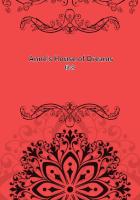MORAL INSTITUTIONS
I. Napoleon's Objectives.
Centralization and moral institutions - Object of the State in absorbing Churches. - Their influence on civil society.
After the centralizing and invading State has taken hold of local societies there is nothing left for it but to cast its net over moral societies[7], and this second haul is more important than the first one; for, if local societies are based on the proximity of physical bodies and habitations, the latter are formed out of the accord which exists between minds and souls; in possessing these, the hold is no longer on the outside but on the inside of man, his thought, his will;the incentive within is laid hold of, and this directly; then only can he be fully mastered, and disposed of at discretion. To this end, the main purpose of the conquering State is the possession of the Churches; alongside as well as outside of itself, these are the great powers of the nation; not only does their domain differ from its own but, again it is vaster and lies deeper. Beyond the temporal patrimony and the small fragment of human history which the eyes of the flesh perceive, they embrace and present to mental vision the whole world and its first cause, the total ordinance of things, the infinite perspective of a past eternity and that of an eternity to come.
Underneath the corporeal and intermittent actions which civil power prescribes and regulates, they govern the imagination, the conscience and the affections, the whole inward being, that mute, persistent effort of which our visible acts are simply the incomplete expressions and rare outbursts. Indeed, even when they set limits to these, voluntarily, conscientiously, there is no limit; in vain do they proclaim, if Christian, that their kingdom is not of this world;nevertheless, it is, since they belong to it; masters of dogma and of morals, they teach and command in it. In their all-embracing conception of divine and human things, the State, like a chapter in a book, has its place and their teachings in this chapter are for it of capital importance. For, here do they write out its rights and duties, the rights and duties of its subjects, a more or less perfect plan of civil order. This plan, avowed or dissimulated, towards which they incline the preferences of the faithful, issues at length, spontaneously and invincible from their doctrine, like a plant from its seed, to vegetate in temporal society, flower and fructify therein and send its roots deeper down for the purpose of shattering or of consolidating civil and political institutions. The influence of a Church on the family and on education, on the use of wealth or of authority, on the spirit of obedience or of revolt, on habits of initiation or of inertia, of enjoyment or of abstention, of charity or of egoism, on the entire current train of daily practice and of dominant impulses, in every branch of private or public life, is immense, and constitutes a distinct and permanent social force of the highest order. Every political calculation is unsound if it is omitted or treated as something of no consequence, and the head of a State is bound to comprehend the nature of it if he would estimate its grandeur.
II. Napoleon's opinions and methods.
Napoleon's opinions on religion and religious belief. - His motives in preferring established and positive religions. - Difficulty in defining the limit between spiritual and temporal authority. - Except in Catholic countries, both united in one hand. - Impossible to effect this union in France arbitrarily. - Napoleon's way of attaining this end by another process. - His intention of overcoming spiritual authority through temporal interests.
This is what Napoleon does. As usual with him, in order to see deeper into others, he begins by examining himself:
"To say from whence I came, what I am, or where I am going, is above my comprehension. I am the watch that runs, but unconscious of itself."These questions, which we are unable to answer,"drive us onward to religion; we rush forward to welcome her, for that is our natural tendency. But knowledge comes and we stop short.
Instruction and history, you see, are the great enemies of religion, disfigured by the imperfections of humanity. . . . I once had faith.
But when I came to know something, as soon as I began to reason, which happened early, at the age of thirteen, my faith staggered and became uncertain."[8]
This double personal conviction is in the back-ground of his thinking, when he drafted the Concordat:
"It will be said that I am a papist.[9] I am nothing. In Egypt I was a Moslem; here I shall be a Catholic, for the good of the people. I do not believe in religions. The idea of a God!" (And then, pointing upward:) "Who made all that?"Imagination has already decorated this great name with its legends.
Let us content ourselves with those already existing; "the restlessness of man" is such that he cannot do without them; in default of those already made he would fashion others, haphazard, and still more strange. The positive religions keep man from going astray;it is these which render the supernatural definite and precise;[10]
"he had better catch it there than pick it up at Mademoiselle Lenormand's, or with some fortune-teller or a passing charlatan." An established religion"is a kind of vaccination which, in satisfying our love of the marvelous, protects us against quacks and sorcerers;[11]the priests are far better than the Cagliostros, Kants, and the rest of the German mystics."In sum illuminism and metaphysics,[12] speculative inventions of the brain or of a contagious overexcitement of the nervous system, all these illusions of gullible men, are basically unhealthy, and, in general, anti-social. Nevertheless, since they are part of human nature, let us accept them like so many streams tumbling down a slope, but on condition that they remain in their own beds and that they have many but no new ones and never one bed alone for itself.















